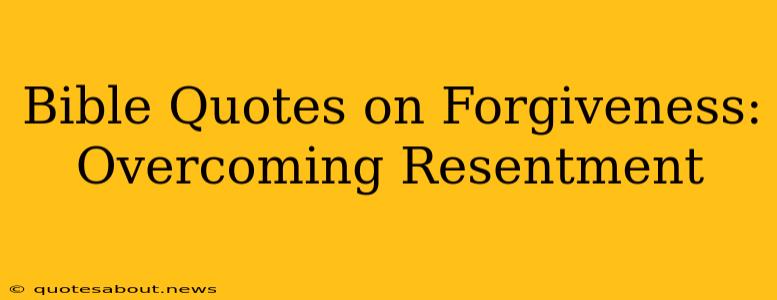Holding onto resentment is like carrying a heavy weight; it burdens the heart and hinders peace. The Bible offers a powerful message of forgiveness, not only for others but also for ourselves. This message is crucial for overcoming resentment and experiencing the transformative power of letting go. This article explores key Bible verses on forgiveness, offering insights into their meaning and practical application in our lives. We'll also delve into common questions surrounding biblical forgiveness.
What Does the Bible Say About Forgiving Others?
The Bible repeatedly emphasizes the importance of forgiving others. Perhaps the most well-known passage is Matthew 6:14-15: "For if you forgive other people when they sin against you, your heavenly Father will also forgive you. But if you do not forgive others their sins, your Father will not forgive your sins." This isn't a conditional forgiveness from God, implying that our forgiveness of others is a reflection of our own need for God's grace. It's about aligning our hearts with God's merciful nature. We are called to forgive as we have been forgiven.
Another powerful verse is Ephesians 4:32: "Be kind and compassionate to one another, forgiving each other, just as in Christ God forgave you." This emphasizes the connection between forgiveness and compassion. True forgiveness stems from a heart filled with empathy and understanding, mirroring the boundless grace God extends to us.
Colossians 3:13 adds: "Bear with each other and forgive one another if any of you has a grievance against someone. Forgive as the Lord forgave you." This highlights the importance of patience and the continuous nature of forgiveness. It's not a one-time event but a continuous process requiring ongoing effort and grace.
How Can I Forgive Someone Who Has Deeply Hurt Me?
Forgiving someone who has deeply hurt you is a challenging but necessary process. It doesn't mean condoning their actions or minimizing the pain they caused. Instead, it's about releasing the bitterness and resentment that poison your heart. It's about choosing to let go of the need for revenge or retribution.
This process often takes time and may involve seeking guidance from a spiritual leader, counselor, or trusted friend. Consider these steps:
- Acknowledge your pain: Don't suppress your emotions. Allow yourself to grieve and process the hurt.
- Pray for the person: Prayer can help you release your anger and bitterness, replacing them with compassion and empathy.
- Focus on healing: Shift your focus from the offender to your own healing and well-being.
- Remember God's forgiveness: Reflect on God's boundless grace and mercy toward you. This can help you extend that same grace to others.
What if I Can't Forgive Someone?
Struggling with forgiveness is understandable. It's a difficult process, and it's okay to seek help. Don't be discouraged if you find it challenging. Remember that forgiveness is a process, not a destination.
God understands your struggles. He doesn't demand perfection, but a willingness to pursue forgiveness. Lean on your faith, seek support from others, and continue to pray for both yourself and the person you are struggling to forgive. The journey towards forgiveness is a journey towards healing and wholeness.
Does Forgiveness Mean Reconciling With the Person?
Forgiveness and reconciliation are distinct but related concepts. Forgiveness is an internal process; it's about releasing resentment and bitterness from your own heart. Reconciliation, however, involves restoring a relationship. While forgiveness is always possible, reconciliation may not always be. Sometimes, for safety and well-being, it's not advisable to reconcile with someone who has harmed you. Forgiveness doesn't require reconciliation, but reconciliation often requires forgiveness.
How Can I Forgive Myself?
Self-forgiveness is just as crucial as forgiving others. We all make mistakes and fall short of our ideals. Holding onto guilt and self-condemnation can be incredibly damaging. Remember that God's grace extends to our shortcomings. 1 John 1:9 assures us, "If we confess our sins, he is faithful and just and will forgive us our sins and purify us from all unrighteousness." This verse emphasizes the importance of confession and God's willingness to forgive us. Accepting God's forgiveness and extending that same grace to ourselves is vital for emotional healing and spiritual growth.
Overcoming resentment through forgiveness is a journey, not a destination. It requires effort, grace, and sometimes, professional help. However, the peace and freedom that come from releasing bitterness are invaluable. Remember the profound truth found in the Bible: forgiveness is not just a command; it's a path to healing and a reflection of God's boundless love.

